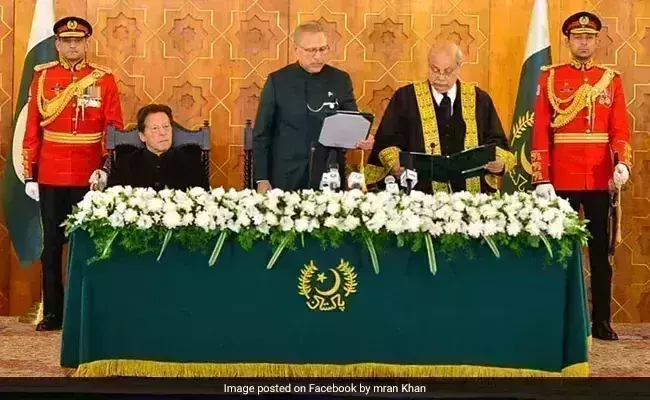
As caretaker PM, Imran Khan Nominates Former Chief Justice Of Pakistan
text_fieldsFormer Chief Justice Gulzar Ahmed was nominated by Pakistani leader Imran Khan on Monday for the office of caretaker prime minister.
Mr Khan made the decision after the Pakistan Tehreek-e-Insaf party's core committee approved it, Fawad Chaudhry, a former information minister and senior party official, said.
A letter was sent on Monday by President Arif Alvi to M. Khan and the Leader of the Opposition Shehbaz Sharif seeking suggestions for the appointment of a caretaker Prime Minister.
"In response to the President's letter, after consultation and approval by the PTI Core Committee, Prime Minister Imran Khan has nominated Pakistan's former chief justice Gulzar Ahmed for the post of caretaker Prime Minister," Chaudhry said.
The President Alvi, in his letter, informed them, if they are not able to reach an agreement on the appointment within three days of dissolution of the Parliament, they should forward the names of two nominees each to a committee to be formed by the Speaker, consisting of eight members of either the Senate or outgoing assembly, with equal representation from the opposition and the Treasury.
According to the President's Secretariat, the Constitution empowers the president to appoint a caretaker prime minister after consulting with the prime minister and the leader of the Opposition in the outgoing National Assembly.
The notification issued by President Alvi specifies that the Prime Minister should continue as Prime Minister until a caretaker premier is appointed.
At the same time, Shehbaz Sharif refused to participate in the process and described it as "illegal", the President and Mr Khan breaking the law and questioning their ability to approach the Opposition.
Fawad Chaudhry, outgoing information minister, commented on Mr Sharif's decision; "Pakistan is gearing up for the elections... Shehbaz has said he will not be a part of the process, that's his choice.We have sent two names (to the president) today. If (Shehbaz) does not send the names within seven days, one of these will be finalised".
As of this morning, the Cabinet Secretariat issued a notification that Khan had been notified that he had "ceased holding the office of prime minister with immediate effect".
Despite this, Article 94 of the Constitution states that the president may request that the Prime Minister continue in office until his or her successor is sworn in.
"Mr. Imran Ahmad Khan Niazi, shall continue as Prime Minister till the appointment of caretaker Prime Minister under Article 224 A (4) of the Constitution of the Islamic Republic of Pakistan," the President tweeted.
Prime Minister Khan had recommended that President Alvi dissolve the National Assembly shortly after the Deputy Speaker Qasim Suri denied a no-confidence motion against him. By doing so, Prime Minister Khan lost his majority in the 342-member lower house.
After taking a suo motu view of the political situation in the country, Supreme Court Chief Justice Umar Ata Bandial ruled that the Prime Minister and President had to comply with the court's order in regard to the dissolution of the National Assembly. He adjourned for one day the hearing of the high-profile case.
In spite of the weekend, the initial hearing was held by a three-member bench, which issued notices to all the respondents, including President Alvi and Deputy Speaker of the NA Suri.
All parties were ordered to refrain from all "unconstitutional" measures by the Supreme Court, which adjourned the hearing to Monday.
According to Ahsan Bhoon, president of the Supreme Court Bar, the action of the prime minister and deputy speaker violated the constitution, and they should be prosecuted for treason under Article 6 of the constitution.
Prime Minister Khan was forced to send a letter to the president to dissolve Parliament after Suri rejected the no-confidence motion, which he could not do until the no-confidence vote resulted.
Salman Akram Raja, a leading constitutional lawyer, called the act of dissolving the assembly and the advice that the deputy speaker received unconstitutional.
Since a no-confidence motion was presented in the parliament against the prime minister, the illegality of the ruling would also make the advice illegal, Raja stated.























